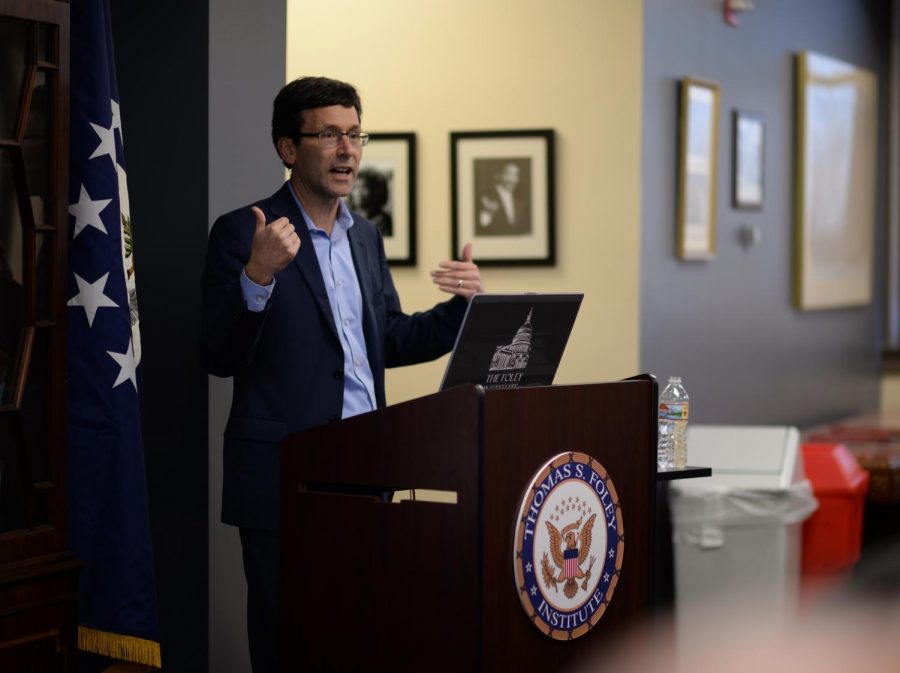Ferguson warns of ‘ghost guns’
State filed 32 lawsuits against Trump administration so far, 3D-printed weapons possible
ZACH RUBIO | THE DAILY EVERGREEN
Washington Attorney General Bob Ferguson details the multiple lawsuits he has been part of against the Trump administration Thursday during a Thomas S. Foley talk in Bryan Hall.
November 30, 2018
Washington Attorney General Bob Ferguson discussed his team’s efforts in opposing the concept of 3D-printed guns at a Thomas S. Foley Institute talk Thursday.
Ferguson said his office has filed 32 lawsuits against President Donald Trump’s administration so far. He said they file lawsuits based on their effect on Washington residents and if they have a legal argument.
Ferguson said the Administrative Procedure Act is one of the main arguments they use. The statute governs the procedural concept government officials need to follow to make regulations.
He compared the act to his childrens’ math homework, which has the problem on the left side and a blank space on the right. The space is where his children show their work and how they arrived to their answer, he said.
“The Administrative Procedure Act is kind of the same thing,” Ferguson said. “The administration has to show their work — how [they arrived at] that decision [and if] there’s a thoughtful process that everyone can understand.”
Ferguson said Washington tends to lead most of the high-profile lawsuits for issues such as the travel ban and transgender military ban. One of the lawsuits his team was a part of in the past concerned the use of 3D printers.
He said 3D printers can create a physical object from a three-dimensional digital model and are becoming more accessible to the public. They can cost from $200 to $10,000.
Ferguson said Defense Distributed CEO Cody Wilson created 3D-printed guns that function like the actual weapon. Defense Distributed is an online nonprofit organization that develops firearm schematics for 3D printing.
“To me, [these] guns are sometimes called ‘ghost guns,’ ” he said. “There’s no serial number, no background check associated with them … [because] you’re printing it out in the privacy of your home.”
After a recent visit at an airport, Ferguson said the security check would not be able to pick up the plastic gun through the screening process. He referred back to Defense Distributed and said Wilson placed manuals on his website which would allow people to print their own guns.
He said the federal government at the time, headed by former President Barack Obama, filed a lawsuit against Wilson in 2015 in Texas and said the manuals could be used to threaten U.S. national security.
“The federal government argued in federal court that by posting this information online, that violated federal laws,” Ferguson said.
The lawsuit went beyond Obama’s time, he said, and Trump’s administration eventually inherited it. Around July of this year, the federal government “quietly” imposed a settlement agreement with Wilson to end the lawsuit, Ferguson said.
“If you ask me the question ‘Why did they do that?’ I cannot answer that question,” he said. “For whatever reason, they entered into agreement that allowed him to legally post that on the internet.”
An audience member asked why 3D-printed guns should be illegal if people can still acquire them through outlets such as the dark web. Ferguson said his job is to enforce the law not make it, but still thinks laws should be followed.
“Just because someone can circumvent the law, doesn’t mean you should not make it illegal,” he said.











